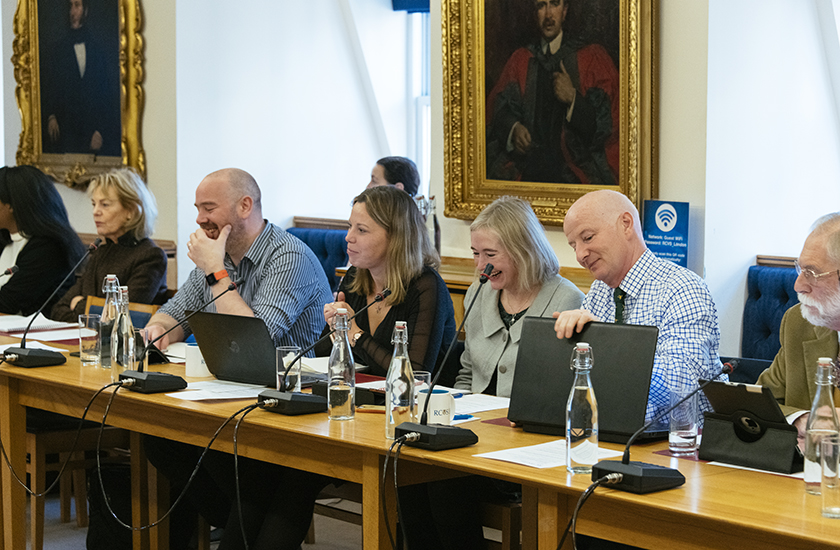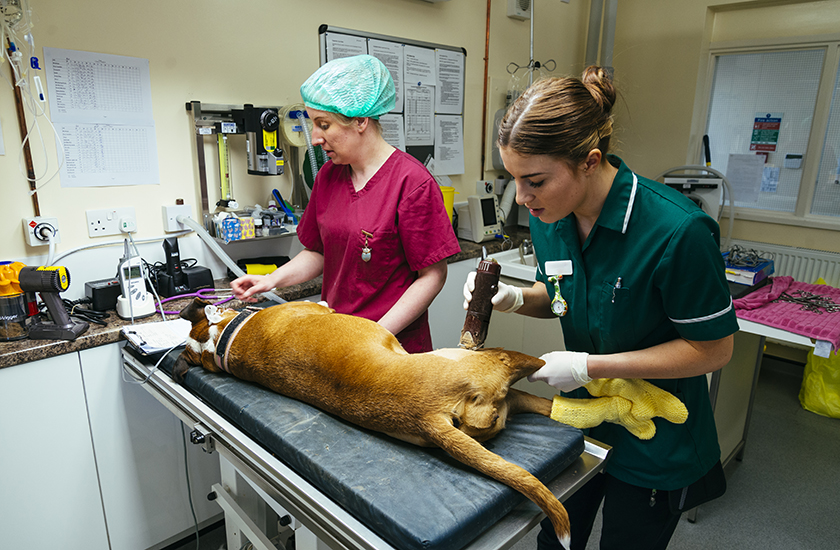-
-
- Council Members
- Role of Council Members
- Council meetings
- Council elections
- Previous election results
- Dr Louise Allum
- Dr Sam Bescoby
- Dr Andrew Clemence
- Dr Tshidi Gardiner
- Dr Reginald Godwin
- Paddy Gordon
- Dr Danielle Greenberg
- Dr Gerard Henry
- Dr Richard Hillman
- Dr Benjamin Kennedy
- Dr Tom Lonsdale
- Dr Darren Partridge
- Martin Peaty
- Alison Price
- Dr Peter Robinson
- Dr Jennifer Simmons
- Dr Sadie Spencer
- Dr Mary Thomas
- William Wilkinson
- Dr Lara Wilson
- Past-Presidents
-
- Advancement of the Professions Committee
- Standards Committee
- Audit and Risk Committee
- Education Committee
- Disciplinary Committee
- Charter Case Committee
- Preliminary Investigation Committee and Disciplinary Committee Liaison Committee
- Registration Committee
- Preliminary Investigation Committee
- Paper classification: some definitions
-
-
-
-
-
- About extra-mural studies (EMS)
- EMS requirements
- Information for vet students
- Information for EMS providers
- Information for vet schools
- Temporary EMS requirements
- Practice by students - regulations
- Health and safety on EMS placements
- EMS contacts and further guidance
- Extra-mural studies fit for the future
-
-
- Code of Professional Conduct for Veterinary Surgeons
- Code of Professional Conduct for Veterinary Nurses
- Contact the Advice Team
- XL Bully dog ban
- 'Under care' - guidance
- Advice on Schedule 3
- Controlled Drugs Guidance – A to Z
- Dealing with Difficult Situations webinar recordings
- FAQs – Common medicines pitfalls
- FAQs – Routine veterinary practice and clinical veterinary research
- FAQs – Advertising of practice names
- GDPR – RCVS information and Q&As
-
- Accrediting veterinary degrees
- Accrediting veterinary nursing qualifications
- Reasonable adjustments for student vets
- Reasonable adjustments for student veterinary nurses
- Health and disability in veterinary nurse education and training
- Reasonable adjustments for students and the UK disability discrimination legislation
- Educational assessment of veterinary nurses
- Roles of key stakeholders in the application of reasonable adjustments
- Examples of reasonable adjustments for vet nurse students
- External review of the RCVS by ENQA
- Requirements for remote and online student assessments
An update on the RCVS Legislation Working Party
The current Legislation Working Party (LWP) was established in early 2017 to review the Veterinary Surgeons Act (VSA) 1966 and related legislation, which legally underpins the work of the College. In doing this it picked up on the outstanding issues recognised by its predecessors, including the LWP responsible for the introduction of the new Charter in 2015. Here Professor Stephen May (pictured) writes about some of Working Party's key work streams, and some of its discussions and decisions thus far.
The RCVS’s responsibilities include maintaining the registers of veterinary surgeons and veterinary nurses eligible to practise in the UK; setting standards for veterinary and veterinary nursing education; and regulating the professional conduct of individual veterinary surgeons and veterinary nurses. In doing this we continue to enhance society through improved animal health and welfare.

It is now more than half a century since the VSA achieved Royal Assent, and the veterinary landscape looks very different today from when the Act was first passed.
Some of the constraints of the current legislation make it difficult for vets and VNs to thrive in the profession – including by limiting the ability of vets to delegate routine tasks to paraprofessionals within the vet-led team while also presenting a challenge for the RCVS to be a modern and forward thinking regulator and to advance standards of animal health and welfare.
While we have managed to stretch the bounds of our regulatory scope within the framework of the VSA through amendments, additional schedules to the Act and changes to our Royal Charter, it is clear that this piecemeal approach is reaching its limits, and a long overdue overhaul is required.
In order to tackle this complex and sizeable piece of work, the LWP is conducting a thorough and wide-ranging review of the VSA, taking a coherent and comprehensive approach which will result in a set of robust recommendations.
Underpinning this process are the themes which have emerged from the Vet and VN Futures projects, including issues around retention, recruitment of veterinary professionals and enabling vets and VNs to build sustainable and fulfilling careers in veterinary medicine.
Additionally, the UK’s upcoming exit from the EU presents challenges and opportunities for the profession, including a risk of exacerbating the existing shortage of vets and blocking up the parliamentary timetable. However, the current lack of parliamentary time available to pursue reform gives us space to conduct a thorough review and consider the future of veterinary legislation in the round.
To that end, some of the major themes which we are considering include:
- Building on the recommendations of the Veterinary Nurse Schedule 3 Working Party;
- Continuing to pursue the statutory regulation of VNs, including protection of title so that only those who are appropriately educated and regulated can call themselves a veterinary nurse;
- Considering proposals to introduce a new role for VNs, allowing those with extensive and structured further training to be able to undertake additional tasks;
- Building on recent recommendations to bring some paraprofessional groups under the umbrella of the RCVS and ensure that they are properly regulated;
- Considering the possibility of regulation at a practice level, rather than only regulating individual veterinary professionals;
- Reviewing the complex issues around the registration of veterinary professionals which are hampered by the current 1966 Act; and
- Reviewing our disciplinary process to ensure it aligns with other healthcare regulators and modern regulatory practice.
We aim to ensure that our vision for the future of veterinary legislation is given proper consideration, and to propose a list of principles that should underpin any new legislation. To ensure that we get our recommendations for this legislation right, we are taking an evidence-based approach, collaborating with stakeholders across the profession, and working with the Department for the Environment, Food & Rural Affairs (Defra) to make the most of this opportunity.
The importance of this work to support the future of the veterinary profession cannot be overstated, as we must meet the needs of both veterinary professionals and the general public with regards to animal health and welfare.
Two years on, we have made some headway in determining how we would like to shape the future of veterinary regulation and the veterinary team.
Regulating paraprofessionals
Back in January 2019, RCVS Council took the historic decision to recommend that some paraprofessional groups be brought under the RCVS’ regulatory umbrella. In approving the way forward for two models of regulation, paraprofessionals can become either associates of, or accredited by the College, depending on the nature of their work and the legal status which would be needed to underpin this.
While some groups would require new legislation to be brought under our wing, others such as the meat inspectors and animal behaviourists are doing work which do not constitute acts of veterinary surgery.
We are delighted that several paraprofessional groups have expressed interest in this decision, and we are working on developing detailed criteria for these two models, so that we can start to take applications soon.
As part of this review we were advised that, where a paraprofession was considered to be undertaking work which would require underpinning by Schedule 3 of the Act, they would need to become associates of the College.
By contrast, where groups were found to be doing minor procedures such as may be suitable for an Exemption Order to the VSA, or not undertaking acts of veterinary surgery at all, accreditation could also be a suitable route. We are currently recruiting for an additional member of staff in order to drive this project forward.
Schedule 3 reform and veterinary nursing
The LWP is developing Schedule 3 reform recommendations that seek to bolster the veterinary nurse role. At this stage, the Working Party is focusing on the specific tasks for delegation to veterinary nurses, and is also considering the possibility of decoupling the right of a VN to undertake Schedule 3 work from the need to be employed by a veterinary practice.
In this way it is possible that VNs may be able to undertake more independent work in the future, whilst still being under the direction of a veterinary surgeon.
The LWP is also in the early stages of exploring the possibility of a veterinary nurse prescriber role, which could allow the prescription of a limited number of medications by VNs, putting it on a par with the current situation in human healthcare where appropriately qualified and registered non-medics can prescribe.
It is crucial to note that, as with human healthcare, this role would be associated with extensive and structured further education and training, and would therefore not be a day one skill for nurses.
It is hoped that, if introduced, this could go some way towards addressing retention issues for both vets and VNs, by providing VNs with a more rewarding career path associated with additional tasks and by giving vets the opportunity to devote time to work that needs to be reserved for them due to its complexity or risk to animal health and welfare.
Any recommendations that may arise from this will need to be supported by robust evidence and research, and so the LWP is currently working closely with our colleagues in human healthcare regulation as well as veterinary organisations to gather the evidence needed to analyse the feasibility of these proposals, in addition to the risks and benefits to animal welfare.
Reforming the disciplinary process
Finally, the LWP has begun looking at potential reforms to the RCVS disciplinary process to see how it can be brought in line with modern regulatory practice.
We have been exploring the primary purpose of regulation (ie to protect animals and the public, to uphold professional standards and to maintain confidence in the veterinary professions) and have outlined a number of areas for discussion as regards the current disciplinary framework.
The review has noted that most other healthcare regulators have a ‘forward looking’ approach to their disciplinary processes, in that the key question is whether a professional’s fitness to practise is currently impaired (known as the ‘fitness to practise’ model).
The LWP intends to meet with colleagues from healthcare regulators to better understand their experience of using the fitness to practise model, with a view to determining whether it is suitable to the veterinary professions and, if it is, how it might be adapted for them accordingly.
Looking ahead to the future
The LWP has a large remit and significant progress has already been made, but there is a lot of work still to do. Over the next few months the LWP hopes to look at outstanding issues with the VSA concerning registration and education, after which time we hope to be able to begin to finalise our recommendations. It is an exciting time for the College and one which we hope will have a positive impact on the professions in years to come.
If you are interesting in finding out more about the LWP’s work, then please make sure to read our series of summaries of all the meetings which it has held so far. These provide further detail on what has been discussed and decided at each meeting.
Published on 30 July 2019

